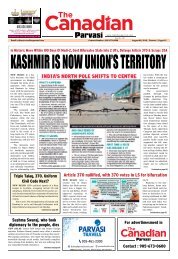Create successful ePaper yourself
Turn your PDF publications into a flip-book with our unique Google optimized e-Paper software.
<strong>The</strong> International News Weekly Canada<br />
August 02, 2019 | Toronto<br />
03<br />
Statistics Canada takes second look<br />
at ethnicity question on census<br />
<strong>The</strong> <strong>Canadian</strong> Press<br />
OTTAWA : Statistics<br />
Canada officials estimate<br />
the number of people identifying<br />
as Jewish in the<br />
2016 census could have been<br />
double what it was if not for<br />
a small change on the questionnaire.<br />
<strong>The</strong> number of people<br />
identifying themselves as<br />
ethnically Jewish on the<br />
census has been on a decline<br />
since 2001, but the drop between<br />
2011 and 2016 far outpaced<br />
the declines between<br />
previous census cycles.<br />
A newly released review<br />
by Statistics Canada<br />
says the census could have<br />
identified between 270,000<br />
and 298,000 Jews in Canada<br />
in 2016 if response patterns<br />
remained steady, instead of<br />
the almost 144,000 captured<br />
in the population count.<br />
<strong>The</strong> review says the decline<br />
is most likely linked to<br />
the removal of Jewish from<br />
a list of examples that goes<br />
along with the question<br />
about ethnic and cultural<br />
origins.<br />
But the reviewers also<br />
note that dropping the examples<br />
entirely could cause<br />
additional problems, such<br />
as respondents not understanding<br />
the question or affecting<br />
the results in different<br />
ways.<br />
<strong>The</strong> national statistics<br />
agency is now testing a new<br />
way to ask people about<br />
their ethnic origins, trying<br />
to wrangle a complex issue<br />
into a simple-to-understand<br />
question in time for the 2021<br />
population counts.<br />
Mr. Rajinder Saini CEO, <strong>Parvasi</strong> Media Group meet<br />
with Mr. Michael Coteau, MPP, Don Valley East and<br />
former Minister of Tourism, Culture and Sport at<br />
<strong>Parvasi</strong> TV studio. He has recently announced to<br />
contest for Ontario Liberal Party leadership.<br />
Man planned to kill ex, not her uncle,<br />
appeal court says in changing conviction<br />
TORONTO: Ontario’s<br />
top court says a Toronto<br />
man who planned to kill<br />
his estranged wife but<br />
ended up killing her uncle<br />
instead should not be<br />
convicted of first-degree<br />
murder because the uncle<br />
was not the plot’s intended<br />
target.<br />
In a decision released<br />
this week, the Court of<br />
Appeal for Ontario says<br />
that while jurors found<br />
Willy Ching intended to<br />
kill his ex’s uncle in the<br />
moment, there was no<br />
planning and deliberation<br />
involved in that slaying.<br />
Meanwhile, the person<br />
he did plan to kill —<br />
his former spouse — was<br />
unharmed, which means<br />
the death of her uncle<br />
cannot be considered<br />
to have occurred as part<br />
of that plan, the court<br />
said.<br />
As a result, the court<br />
says Ching’s conviction<br />
for first-degree murder<br />
should be quashed and<br />
replaced with one for<br />
second-degree murder,<br />
which does not involve<br />
advance planning.<br />
Court heard Ching<br />
bought a hatchet and<br />
knife and was trying to<br />
get into the home where<br />
his estranged wife, Maria<br />
Ching, was staying, but<br />
her uncle intervened and<br />
was fatally wounded in<br />
the struggle.<br />
<strong>The</strong> appeal court says<br />
the trial judge erred in<br />
telling jurors they could<br />
find Willy Ching guilty<br />
of first-degree murder if<br />
they found he planned<br />
to kill his former spouse<br />
and killed her uncle, Ernesto<br />
Agsaulio, in the<br />
process of carrying out<br />
that plan. His plan was,<br />
in fact, not carried out, it<br />
said.<br />
<strong>The</strong> court said the<br />
trial judge misapplied of<br />
a ruling by the Supreme<br />
Court of Canada in a case<br />
involving a man who accidentally<br />
killed his children<br />
while trying to kill<br />
his spouse.<br />
“<strong>The</strong> jury found that<br />
the appellant intended<br />
to kill Mr. Agsaulio …<br />
<strong>The</strong> planning and deliberation,<br />
however, was<br />
in respect of a different<br />
intended killing, the killing<br />
of Ms. Ching,” the<br />
appeal court wrote in its<br />
decision, noting jurors<br />
were not asked to consider<br />
whether the uncle’s<br />
murder was planned and<br />
deliberate.<br />
“<strong>The</strong> plan to kill Ms.<br />
Ching never reached the<br />
point where the appellant<br />
executed the killing. Ms.<br />
Ching remained on the<br />
second floor of the house<br />
well beyond the reach of<br />
the appellant. One will<br />
never know whether, had<br />
the appellant been allowed<br />
into the house, he<br />
would have carried out<br />
his plan,” it said.<br />
“<strong>The</strong>re is a sound policy<br />
reason for concluding<br />
that an accused who intentionally<br />
kills person<br />
B when in the course of<br />
carrying out the planned<br />
and deliberate murder of<br />
person A will be guilty<br />
of second-degree murder,<br />
whereas an accused<br />
who accidentally or mistakenly<br />
kills person B<br />
when person A was the<br />
target will be convicted<br />
of first-degree murder,”<br />
it said.<br />
“This result reflects<br />
the fact that in the first<br />
case the actual killing<br />
may well have been impulsive<br />
while in the second,<br />
it was the result of<br />
a planned and deliberate<br />
act.”<br />
However, the court<br />
rejected arguments that<br />
the trial judge had also<br />
erred in his instructions<br />
to jurors regarding Ching’s<br />
attempt to jump<br />
over a staircase railing<br />
upon learning Agsaulio<br />
had died, and those regarding<br />
Ching’s conflicting<br />
statements in his<br />
testimony and police interviews.<br />
Court heard the couple’s<br />
marriage fell apart<br />
in 2009 and that September,<br />
Maria Ching moved<br />
out of their shared home<br />
to go live with Agsaulio<br />
and his family in nearby<br />
Mississauga, Ont.<br />
Willy Ching did not<br />
accept that the marriage<br />
was ending and repeatedly<br />
tried to speak to his<br />
former spouse, the decision<br />
said.<br />
In October, Ching became<br />
upset after unsuccessfully<br />
trying to access<br />
his ex’s email account,<br />
and bought a knife and<br />
hatchet, the document<br />
said.<br />
<strong>The</strong> next day, he<br />
drove to Agsaulio’s house<br />
in an effort to see his exwife,<br />
the document said.<br />
<strong>The</strong> couple’s daughters<br />
alerted their mother,<br />
who then called Ching<br />
and told him to go home,<br />
the ruling said. He asked<br />
her to come outside to<br />
talk, but she refused and<br />
warned her uncle that<br />
Ching was on his way to<br />
the house, it said.<br />
When Ching rang the<br />
doorbell, it was Agsaulio<br />
who answered and<br />
refused to let him in,<br />
the document said. <strong>The</strong>y<br />
talked for a few minutes,<br />
then Ching began<br />
“hacking and slashing”<br />
at Agsaulio before he<br />
could be restrained, it<br />
said.<br />
Agsaulio was still<br />
alive when Ching was arrested<br />
and charged with<br />
assault, it said.<br />
He gave a statement<br />
to police, saying he had<br />
only wanted to talk to his<br />
wife and had not tried to<br />
kill anyone, it said.<br />
By the end of the interview,<br />
however, police<br />
informed Ching that Agsaulio<br />
had died and the<br />
charge would be upgraded<br />
to first-degree murder,<br />
the decision said. Ching<br />
then asked to use the<br />
bathroom, ran towards<br />
the stairwell and tried to<br />
“fling himself headfirst<br />
over the railing,” but officers<br />
held him back, it<br />
said.<br />
He gave a second<br />
statement to police the<br />
next day, repeating<br />
that he had gone to the<br />
house to speak to his ex<br />
and had not intended to<br />
hurt anyone, the document<br />
said.<br />
Ching said he had<br />
brought the knife and<br />
hatchet because he wanted<br />
to threaten to hurt<br />
himself if his ex didn’t<br />
take him back, it said.<br />
Second-degree murder<br />
carries an automatic<br />
life sentence with no<br />
chance of parole for 10 to<br />
25 years.
















